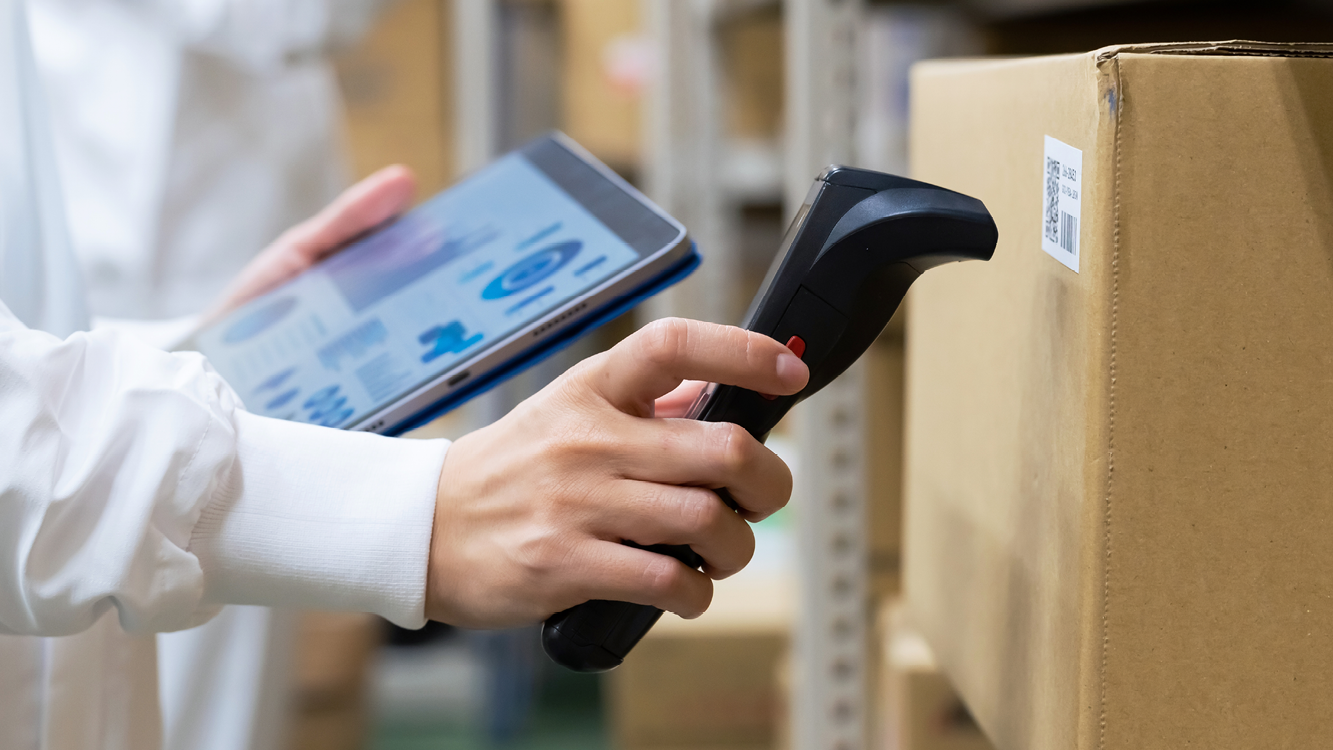Revolutionise the Food Supply Chain with RFID Technology
Help your clients comply with regulations and meet consumer demands for traceability in innovative ways with this familiar technology.
BlueStar's diverse portfolio offers unparalleled access to premium products and services that drive business growth and success. From state-of-the-art hardware to advanced software solutions, our portfolio is designed to empower businesses with the tools they need to thrive in today's competitive landscape.
Our vertical-based content focuses on different industry technologies, solutions, and insights.
A true VAD offers top-notch pick, pack and ship services, and provides programs and services that add value to the distributed products that increase their value or worth.
The BlueStar DifferenceLeverage wearable RFID scanners to boost productivity and accuracy for your logistics, healthcare, field service, and retail clients.
Throughout the EU, the need for businesses to streamline their operations and maintain a competitive advantage is growing stronger. For technology solutions providers (TSPs), this demand fosters an environment ripe for introducing and implementing cutting-edge technologies that yield tangible gains in efficiency and accuracy. One example is RAIN RFID, a subset of RFID that uses the UHF frequency (860–960 MHz band). Nearly 45 billion RAIN RFID tags were deployed globally in 2023 (32% YoY growth). This market, valued at $3.47 billion in 2023, is projected to reach $8.37 billion by 2030, with retail (41% market share) and healthcare leading adoption.
Within the RAIN RFID trend, wearable RFID scanners have emerged as a highly adaptable and effective solution, providing the crucial benefit of hands-free operation. This key advantage is driving widespread adoption and leading to significant improvements across various sectors, including the fast-evolving world of warehouse management, the dynamic realm of mobile applications, the essential field of healthcare, and the customer-oriented retail landscape.
Wearable RFID Scanners in Warehousing
In the complex field of warehouse management, utilising wearable RFID scanners represents a significant advancement in operational efficiency. Traditionally, the reliance on handheld scanners creates bottlenecks, as workers must pause their material handling tasks to physically scan barcodes or RFID tags. This process prolongs each transaction and increases the risk of dropped items and other handling errors.
Wearable RFID scanners, which can be integrated into gloves, wristbands, or other wearable formats, free up workers’ hands, allowing them to manage items while simultaneously capturing data. This hands-free approach significantly enhances essential processes like inventory tracking, detailed order picking, and efficient packing. Consequently, it accelerates the flow of goods, minimises costly errors, and creates a more responsive and adaptable supply chain.
For TSPs, the potential lies in delivering comprehensive, all-inclusive solutions that seamlessly integrate these wearable scanners with existing warehouse management systems, providing real-time visibility and oversight of inventory and workflows. This integration and robust data analytics capabilities empower logistics and manufacturing clients to make better-informed decisions and optimise their warehouse operations to an extraordinary extent.
Field Service and the Benefits of Wearable RFID Scanners
Outside the warehouse, field service technicians often operate in demanding environments and can effectively use these hands-free devices. Picture a technician servicing intricate machinery; a wearable RFID scanner can swiftly identify and record equipment information, consult maintenance records, or request replacement parts without the hassle of managing a separate scanning tool. This expedites service calls while improving the precision of asset management and reporting.
Wearable RFID Scanners Deliver Results in Healthcare
The healthcare sector, constantly prioritising patient safety and efficient workflows, presents a significant opportunity for wearable RFID scanners. Healthcare professionals must access and log information swiftly and accurately without sacrificing patient interaction. Wearable RFID solutions, such as wristbands and wearable RFID readers, facilitate precise patient identification, ensuring appropriate care is delivered to the right person at the right moment. Additionally, these wearable devices simplify the intricate medication administration process, enabling verification of dosages and patient information with a quick scan. For TSPs, the potential lies in creating secure and reliable solutions that integrate wearable RFID technology with electronic health records (EHR) and other hospital information systems, ultimately enhancing patient outcomes and optimising administrative workflows.
Want to see some uses and examples? :
RFID-enabled wristbands are used for patient monitoring and record-keeping, allowing healthcare staff to quickly access patient information and track their location within the facility.These wristbands can contain essential data such as medical history, allergies, and current medications, ensuring that patients receive accurate and timely care.
Another example is wearable RFID readers used by healthcare professionals to track and manage medical equipment. These readers can be worn on the wrist or as part of a uniform, enabling staff to quickly locate and verify the status of critical equipment, such as surgical instruments and diagnostic devices This real-time tracking helps reduce the risk of errors and ensures that equipment is properly sterilised and maintained.
Retail Benefits of Wearable RFID Scanners
Finally, the retail sector, constantly striving to enhance operational efficiency and customer experience, increasingly recognises the value proposition of wearable RFID scanners. For retail staff navigating busy store floors, the ability to conduct inventory checks, locate specific items for customers, or manage restocking efforts without relying on handheld devices offers a significant advantage. Imagine an associate instantly verifying a product’s availability for a customer while remaining engaged in conversation or quickly identifying misplaced merchandise without disrupting the flow of customer interaction. Moreover, wearable scanners can be integrated with point-of-sale systems and customer relationship management (CRM) platforms, providing staff with real-time product information, pricing details, and even customer purchase history, enabling them to offer more personalised and informed service. This enhances operational efficiency in stock management and elevates the shopping experience, fostering greater customer satisfaction and loyalty. For TSPs serving the retail sector, the focus can be on developing intuitive and integrated solutions that empower store associates, optimise inventory management, and ultimately contribute to increased sales and customer retention.
Adopting wearable RFID scanners is not merely a technological trend but a strategic imperative for businesses across various industries within the EU. The fundamental advantage of hands-free operation translates directly into tangible benefits, including enhanced efficiency, improved accuracy, and increased worker satisfaction. Understanding wearable RFID scanners’ diverse applications and integration potential presents a significant opportunity to offer innovative and value-added solutions to clients in warehousing, mobility, healthcare, retail, and beyond.

Help your clients comply with regulations and meet consumer demands for traceability in innovative ways with this familiar technology.

See how this technology can solve challenges other data collection solutions couldn’t.

Why RFID Is EMEA’s Hottest Tech Opportunity – Now and For Years to Come
